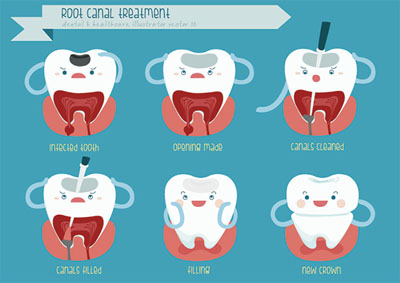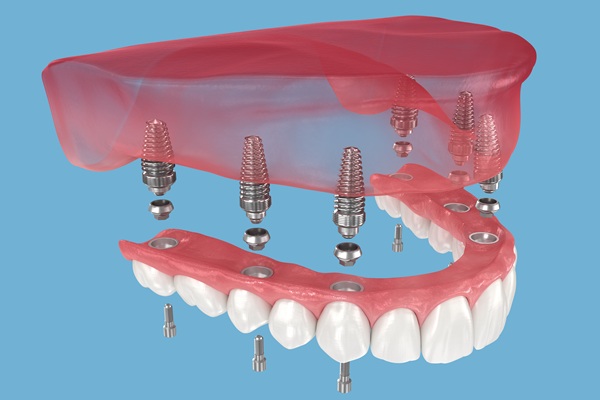Do I Need an Apicoectomy if My Root Canal Does Not Work?

With a root canal, a dentist or endodontist can eliminate pain and save the patient’s permanent tooth; Two great accomplishments. Although dental professionals do everything they can before resorting to this procedure, patients typically handle it quite well. A root canal has a high rate of success for the millions of people who have it performed each year. However, there are times when it does not help.
What is an apicoectomy?
In rare cases, a root canal does not work. When that happens, a dentist may recommend the patient have an apicoectomy. Also referred to as “root end surgery,” this is the procedure a dentist typically chooses if an infection develops or continues following a root canal. Ultimately, dental professionals use this method to try to save the patient’s natural tooth when other remedies fail.
How is an apicoectomy performed?
For an apicoectomy, a dentist or endodontist first numbs the gum area with local anesthesia. Next, the dental professional makes an incision along the gumline near the diseased or damaged tooth. That allows them to reach the infected or inflamed tissue to remove it. At the same time, they remove the tip of the tooth’s root. Next, the dentist seals the end portion of the root canal. After suturing the incision, the bone begins to heal around the root end, which usually takes a couple of months.
Is an apicoectomy painful?
The attending dentist or endodontist numbs the infected area around the tooth. Therefore, the only pain the patient feels is the prick of the needle. For severe cases, the dentist applies a numbing medicine first, which helps reduce this discomfort. When an infection is extremely bad, the dental professional may opt to perform the surgery under general anesthesia.
Compared to a conventional root canal, an apicoectomy involves a little more work. For that reason, it is common for patients to experience either pain or discomfort after returning home. However, the dentist can prescribe pain medication or recommend something over-the-counter. That along with rest and ice to reduce swelling helps tremendously.
A positive option
Seldom does a root canal fail. When someone does not have pain checked by a dentist, the problem only worsens. At some point, a tooth becomes diseased or damaged, which includes an infection. As a result, filling a simple cavity is no longer a viable option. Instead, the dentist would perform a root canal. However, if that does not help, patients have another surgical option in the form of an apicoectomy.
People need to see this as something positive. The reason is that like a root canal, an apicoectomy can save permanent teeth — dentists’ ultimate goal. With natural teeth, people never experience issues with talking or chewing. Avoiding implants and dentures is also more cost-effective for the patient. Therefore, having this second form of oral surgery available is a good thing.
See a dentist about a root canal or an apicoectomy
As soon as you start to develop pain in one of your teeth, see your dentist right away. That gives them the opportunity to fill a small cavity or stop a minor infection. Otherwise, you could find yourself needing a root canal. If that fails, your dentist would likely suggest an apicoectomy. When it comes to your teeth, it is always better to act quickly rather than wait.
Request an appointment here: http://lbfamilydental.com or call Leila Zamiri DDS at (562) 453-1214 for an appointment in our Long Beach office.
Check out what others are saying about our services on Yelp: Read our Yelp reviews.
Recent Posts
An immediate visit to an emergency dentist becomes necessary when severe tooth pain or infection disrupts your comfort and overall quality of life. This dental professional provides immediate evaluation and relief, particularly when a root canal is required to preserve a damaged or infected tooth. Root canal treatment from an emergency dentist can help alleviate…
Thinking about choosing implant-supported dentures to replace your missing teeth? This type of denture offers many benefits, which is why this denture choice has become so popular. However, properly caring for dentures supported by implants is necessary so they will last for many years.While there are many different types of denture choices to choose from,…
Choosing the right dental office is essential for maintaining good oral health and ensuring a positive dental experience. When visiting a new dental office, it is important to ask the right questions to ensure the practice meets your specific needs and expectations. Whether you are new to the area or simply seeking a change, asking…
Traditional braces are one of the most effective orthodontic solutions for straightening teeth and correcting bite issues. Many individuals are surprised to learn that receiving traditional braces from a general dentist can be a convenient and effective way to improve their smile. General dentists with additional training in orthodontics can provide comprehensive care, guiding patients…


